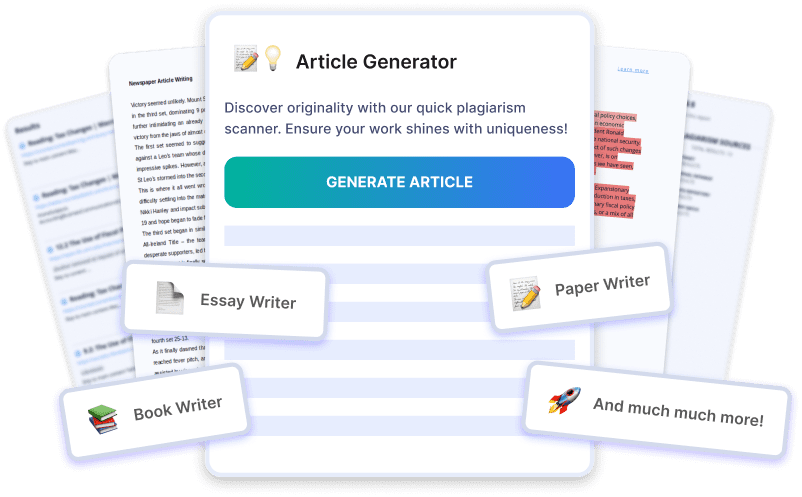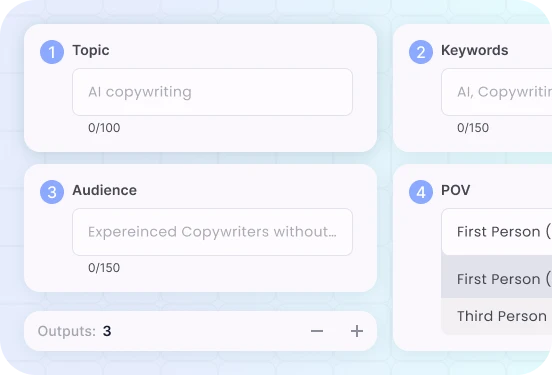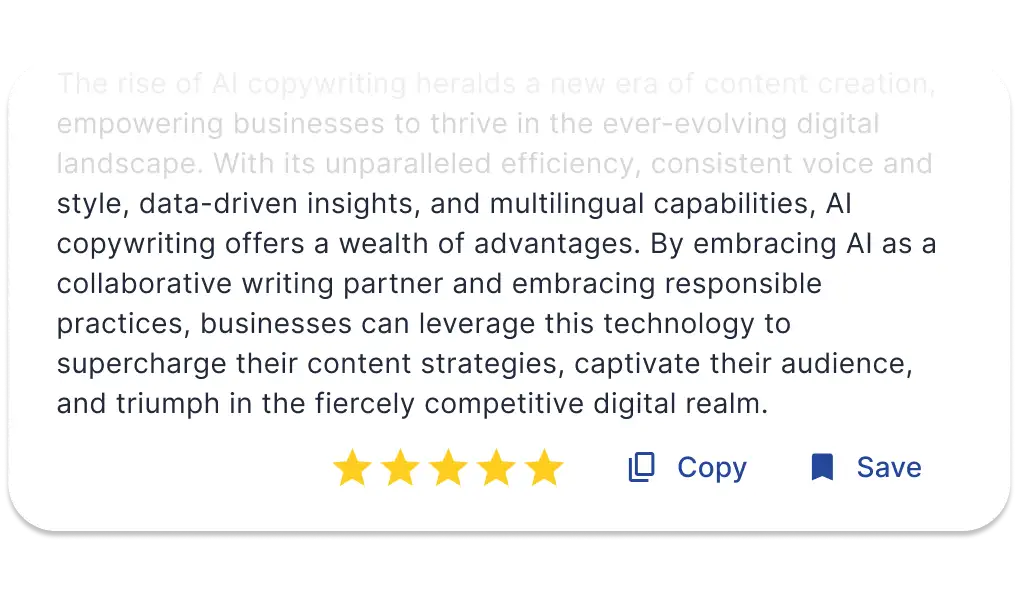Revolutionize AI Research Literature Review
Discover, analyze, and synthesize the latest AI research literature with Justdone.ai's advanced tools and insights.
Try Justdone
AI Insights Made Simple
Efficient Analysis
Streamline your AI research literature review process with Justdone.ai's efficient analysis tools.
Comprehensive Synthesis
Transform complex AI research literature into concise, comprehensive insights effortlessly using Justdone.ai.
Enhanced Insights
Gain deeper, more meaningful insights from AI research literature with Justdone.ai's advanced analytics capabilities.
AI Research Literature Review Benefits
Comprehensive AI Research
When conducting an AI research literature review, you gain access to a comprehensive collection of academic works and studies relevant to your area of interest. This allows you to delve deep into the latest advancements and findings in the field, providing valuable insights for your own research.
By accessing a wide range of literature, you can identify gaps in existing knowledge, explore different methodologies, and understand the evolution of AI research over time. This comprehensive approach enhances the quality and credibility of your own work, contributing to the advancement of AI knowledge and applications.
Try Justdone ->
Informed Decision-Making
Engaging in AI research literature review equips you with the knowledge and understanding required for informed decision-making. By critically analyzing existing literature, you can evaluate the strengths and limitations of various AI models, algorithms, and technologies, empowering you to make well-informed choices in your own research and development endeavors.
Furthermore, staying updated on the latest research trends and breakthroughs enables you to anticipate future developments and align your AI strategies with emerging opportunities, ensuring that your decisions are forward-thinking and impactful.
Try Justdone ->
Credible Source of Information
The AI research literature review serves as a credible and authoritative source of information, enabling you to substantiate your arguments, hypotheses, and findings with robust evidence from reputable academic sources. This enhances the validity and reliability of your research outcomes, instilling confidence in the accuracy and relevance of your contributions to the field of AI.
By drawing upon established literature, you can build a strong theoretical foundation for your research, strengthen the academic rigor of your work, and establish yourself as a knowledgeable and respected contributor to the AI research community.
Try Justdone ->
Effective Strategies for AI Research Literature Review
Thematic Analysis
Utilize thematic analysis to categorize and interpret the key themes, concepts, and findings across the AI literature. This approach enables you to identify recurring patterns, controversies, and emerging topics, providing a holistic understanding of the research landscape. Consider using software tools to facilitate the organization and visualization of thematic insights.
By conducting a rigorous thematic analysis, you can uncover underlying connections and disparities within the AI literature, paving the way for insightful interpretations and informed synthesis of diverse perspectives.
Cross-Referencing Sources
Engage in cross-referencing sources to validate the reliability and consistency of information presented in various AI research publications. By cross-referencing multiple sources, you can corroborate key findings, verify the credibility of authors, and detect potential biases or conflicting viewpoints. This critical approach enhances the robustness and integrity of your literature review, fostering a well-rounded and balanced representation of AI knowledge.
Cross-referencing also facilitates the identification of seminal works and influential scholars in the AI domain, enriching the contextualization and historical framing of your literature review.
Synthesizing Diverse Perspectives
Embrace the practice of synthesizing diverse perspectives from AI literature to construct a comprehensive narrative that encompasses varied viewpoints, methodologies, and theoretical frameworks. By integrating contrasting perspectives, you can present a nuanced and inclusive analysis of the subject matter, fostering a more holistic understanding of the complexities and nuances within the AI research landscape.
Through the synthesis of diverse perspectives, you can construct a cohesive and multifaceted literature review that contributes to the interdisciplinary dialogue surrounding AI, enriching the scholarly discourse and promoting intellectual diversity.
Critical Evaluation
Employ critical evaluation techniques to assess the methodological rigor, theoretical coherence, and empirical validity of AI research literature. By critically appraising the strengths and limitations of published works, you can discern the reliability of evidence, the soundness of arguments, and the potential for bias or generalization. This critical lens enables you to discern high-quality contributions, identify areas for improvement, and refine the scholarly rigor of your literature review.
Furthermore, critical evaluation fosters a discerning and analytical mindset, equipping you with the skills to navigate the complex terrain of AI literature with intellectual acumen and scholarly rigor.
Collaborative Discourse
Engage in collaborative discourse with peers, mentors, and experts in the AI field to solicit diverse perspectives, gather feedback, and refine your literature review. Actively participating in scholarly discussions and interdisciplinary exchanges cultivates an environment of intellectual growth, enabling you to leverage collective wisdom, challenge assumptions, and elevate the scholarly impact of your literature review.
By fostering collaborative discourse, you can enrich the depth and breadth of your AI research literature review, harnessing the collective insights and expertise of the academic community to elevate the scholarly discourse and advance the frontiers of AI knowledge.
How to use Article Generator
- 1
Choose a template
Select the necessary template from the template gallery.

- 2
Provide more details
Fill out the carefully selected inputs to create the best quality of output content.

- 3
Enjoy the results
Copy, save for later, rate the output or hit regenerate button.

AI Research Literature Review Example
Explore an example of an AI research literature review to gain valuable insights into the evolving landscape of artificial intelligence and its interdisciplinary applications.
Craft a comprehensive literature review that synthesizes the advancements in AI research, highlighting the implications for real-world applications and interdisciplinary collaborations.
In response to the query, the literature review will embark on a comprehensive synthesis of the latest advancements in AI research, encompassing diverse domains such as machine learning, natural language processing, computer vision, and robotics. By critically analyzing seminal works and contemporary studies, the literature review aims to elucidate the transformative implications of AI for real-world applications and interdisciplinary collaborations, offering a panoramic exploration of the evolving landscape of artificial intelligence.
To achieve this, the literature review will employ a thematic analysis approach to distill the core themes, emerging trends, and ethical considerations prevalent in the AI literature. Through the identification of key thematic clusters and conceptual patterns, the review will unravel the interconnectedness of AI advancements with real-world applications, shedding light on the multifaceted impact of AI on diverse industries and societal domains.
Furthermore, the literature review will integrate cross-referencing techniques to validate the credibility and consistency of information across a spectrum of AI research sources. By cross-referencing influential works and scholarly contributions, the review will fortify the robustness and reliability of its narrative, ensuring a comprehensive and well-substantiated representation of AI's implications for real-world applications and interdisciplinary collaborations.
In synthesizing diverse perspectives from AI literature, the review will endeavor to construct a cohesive and inclusive narrative that reflects the interdisciplinary nature of AI advancements. By weaving together contrasting viewpoints, methodological approaches, and theoretical frameworks, the literature review will articulate a comprehensive portrayal of AI's transformative potential, underscoring the convergence of AI research with real-world applications and interdisciplinary collaborations.
Moreover, critical evaluation techniques will be employed to scrutinize the methodological rigor, ethical considerations, and societal implications embedded within the AI literature. By critically appraising the ethical dimensions, technological implications, and societal ramifications of AI advancements, the literature review will cultivate a discerning analysis that delves into the implications of AI for real-world applications and interdisciplinary collaborations, fostering a nuanced understanding of the ethical and societal dimensions of AI progress.
Lastly, the literature review will actively engage in collaborative discourse with AI experts, industry practitioners, and interdisciplinary scholars to enrich its insights and refine the interdisciplinary implications of AI advancements. By fostering an environment of collaborative dialogue and knowledge exchange, the review will harness the collective wisdom and diverse perspectives of the AI community, amplifying the scholarly impact of its findings and contributing to the interdisciplinary discourse surrounding AI's transformative potential for real-world applications and collaborative endeavors.
Write a literature review that highlights the ethical considerations and societal impact of AI advancements, elucidating the implications for interdisciplinary collaborations and responsible innovation.
The literature review will embark on a comprehensive exploration of the ethical considerations and societal impact of AI advancements, delving into the multifaceted implications for interdisciplinary collaborations and responsible innovation. By synthesizing seminal works, contemporary insights, and ethical frameworks, the review aims to unravel the intricate ethical dimensions and societal ramifications inherent within the evolving landscape of AI, offering a discerning analysis of the responsible and collaborative aspects of AI progress.
To accomplish this, the literature review will employ a thematic analysis approach to discern the underlying ethical themes, societal implications, and collaborative imperatives prevalent in AI literature. By categorizing and interpreting the ethical and societal dimensions across diverse AI domains, the review will elucidate the ethical considerations and collaborative imperatives that underpin responsible innovation and interdisciplinary engagements in the realm of AI.
Furthermore, the review will integrate cross-referencing techniques to validate the credibility and coherence of ethical insights and societal perspectives embedded within the AI literature. By cross-referencing influential works and ethical frameworks, the review will fortify the robustness and integrity of its narrative, ensuring a comprehensive and well-substantiated exploration of AI's ethical and societal impact on interdisciplinary collaborations and responsible innovation.
In synthesizing diverse perspectives from AI literature, the review will endeavor to construct a cohesive and inclusive narrative that reflects the ethical and societal complexities of AI advancements. By weaving together contrasting viewpoints, ethical frameworks, and collaborative paradigms, the literature review will articulate a comprehensive portrayal of AI's ethical and societal implications, highlighting the imperative for responsible and collaborative innovation in interdisciplinary engagements.
Moreover, critical evaluation techniques will be employed to scrutinize the ethical coherence, societal considerations, and collaborative imperatives embedded within the AI literature. By critically appraising the ethical dimensions and societal ramifications of AI advancements, the review will cultivate a discerning analysis that delves into the ethical and societal implications of AI progress, fostering a nuanced understanding of responsible innovation and collaborative engagements in the context of AI advancements.
Lastly, the literature review will actively engage in collaborative discourse with ethicists, interdisciplinary scholars, and industry practitioners to enrich its insights and refine the ethical and societal implications of AI advancements. By fostering an environment of collaborative dialogue and knowledge exchange, the review will harness the collective wisdom and diverse perspectives of the AI community, amplifying the scholarly impact of its findings and contributing to the responsible and collaborative discourse surrounding AI's ethical considerations and interdisciplinary engagements.